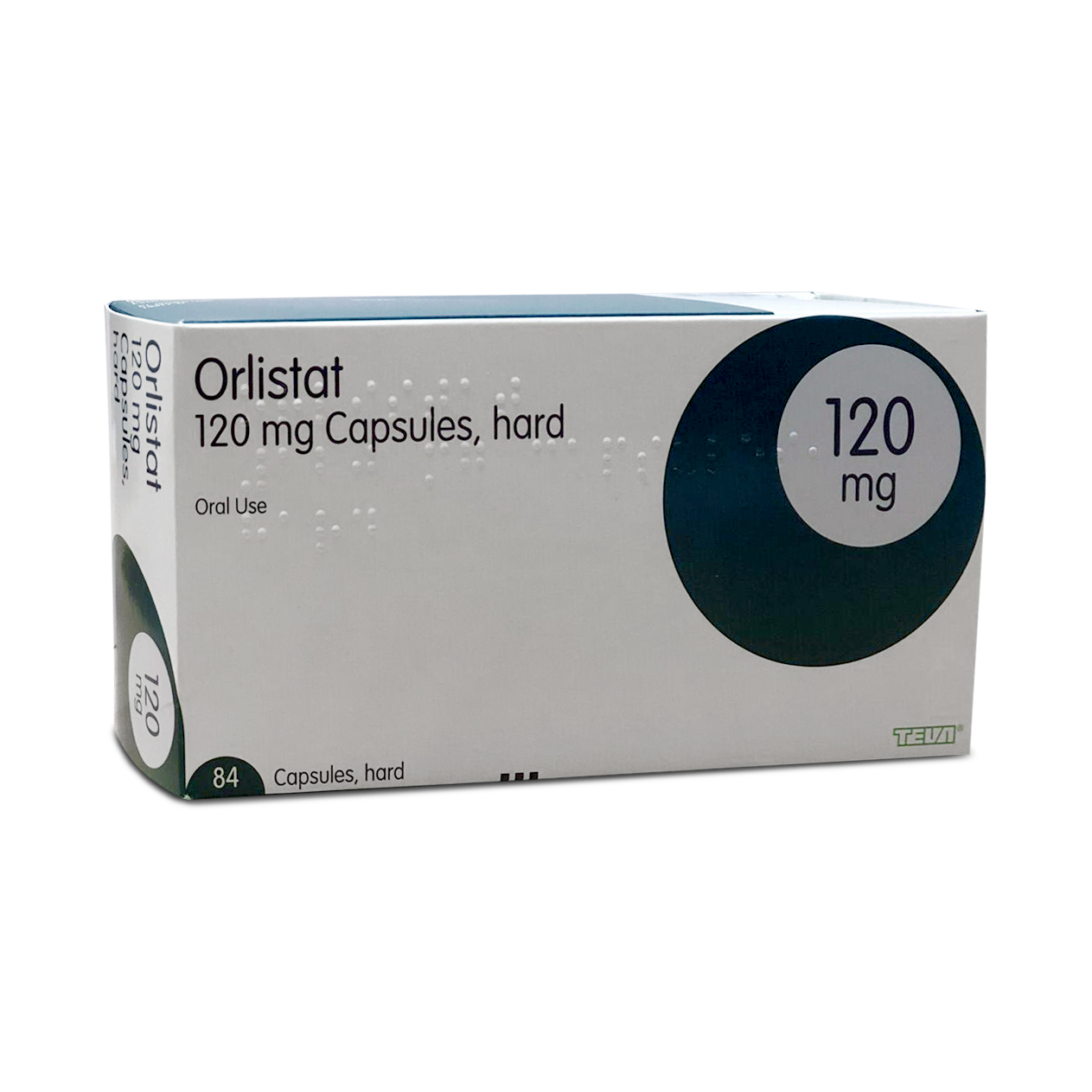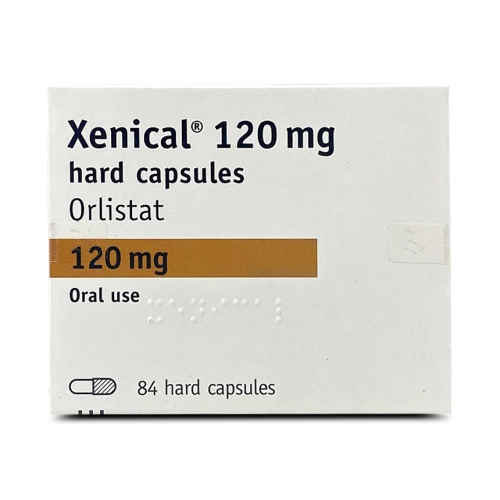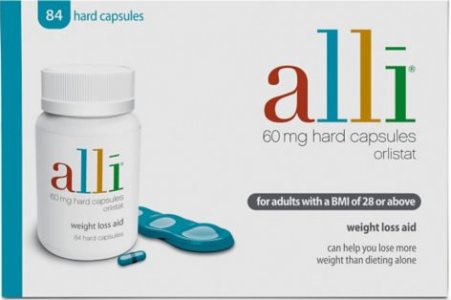Orlistat
Orlistat is a clinically tested and proven weight loss treatment. It blocks the absorption of fat, helping users to lose weight. It is licensed for use in those who have a BMI of 30 kg/m2 or higher. It is most effective when used in conjunction with a healthy diet and lifestyle.
-
 Next Day Delivery
Next Day Delivery
-
 Plain & Discreet Packaging
Plain & Discreet Packaging
-
 Confidential Service
Confidential Service
-
 UK registered service
UK registered service
Orlistat Prices
| Medicine | x42 Capsules (2 Weeks) | x84 Capsules (4 Weeks) | x168 Capsules (8 Weeks) | x252 Capsules (12 Weeks) |
|---|---|---|---|---|
| Orlistat 120mg Capsules | £16.99 | £33.95 | £67.89 | £98.89 |
About Orlistat
Key Points
- Orlistat helps you safely lose weight in 6 to 12 months
- It stops enzymes breaking down fat in your digestive system and removes it from your body
- To be taken alongside a calorie-controlled diet and active lifestyle
Buy Orlistat
Buy orlistat online from our safe and regulated UK pharmacy. This medicine requires a prescription. To purchase orlistat 120mg capsules complete our short online questionnaire which will be assessed by our in-house clinicians and if approved, dispatched and delivered to your door using our next day delivery service.
What is Orlistat?
Orlistat is a medication used to help reduce weight in obesity. It is one of the few licensed diet pills available. It also supports individuals to help maintain weight loss by reducing the chance of putting weight back on. Orlistat is taken with meals and blocks around 30-40% of fat from being absorbed by your body, passing it out in your stools. It works best with a reduced calorie diet, and clinical trials have suggested it can also be beneficial to blood pressure and diabetes. It is licensed for use in adults only.
How Does Orlistat Work?
It works by blocking stomach enzymes from breaking down fat. Orlistat mechanism of action stops the body from absorbing fat, and it passes through the gut in the form of faeces. This reduces the level of fat that your body absorbs, so that it is not stored in the body. As a result, you lose weight. Orlistat prevents the absorption of around 30% of fat that is consumed.
Orlistat Dosage Instructions
How to Take Orlistat
Orlistat capsules should be used in conjunction with an increase in exercise and a calorie-controlled diet. Your daily intake of fat should be no more than 30% of your daily calorie intake. For example, if your daily calorie intake is 1,800 calories, no more than 540 calories (30% of 1,800 calories) should come from fat. Most food packaging has nutritional information that can be used to help you.
How Long Does Orlistat Take to Work?
Orlistat can take anywhere from around 1-3 months to work. You should aim to lose 5% of your starting weight. Orlistat is likely to help you to lose weight quicker, in conjunction with a healthy diet and exercise plan.
What Happens if You Take Orlistat Without Eating?
You do not need to take orlistat for weight loss if you are not having a meal, or, if you are having a meal which is low in fat, for example, a salad. Orlistat has no benefit where a meal is not consumed, and may increase the chances of side effects, such as an upset stomach.
How to Get the Best Results with Orlistat
Studies and research have shown that orlistat is clinically effective in helping to reduce weight in obese individuals; however, to get the best results with orlistat, it is important to take orlistat tablets in conjunction with a calorie-reduced diet and an increase in exercise. This way you are likely to see encouraging results and avoid disappointment. Just remember, results will not happen overnight, or a week. It is important to be persistent and stay positive.
You can visit the NHS website for support on how to lose weight.
When to Take Orlistat
Orlistat should only be used by obese or overweight individuals who have a Body Mass Index (BMI) of 30kg/m² or more. It can also be used by those with a BMI of 28kg/m² who have other risk factors for obesity related diseases, such as type 2 diabetes, high blood pressure or high cholesterol. You must be above the age of 18 to use orlistat (in special circumstances, it may be prescribed for children over the age of 12 as an unlicensed use of the medication).
When to Stop Taking Orlistat
You should stop using orlistat once your BMI has reached 25kg/m². Alternatively, if you have not lost 5% of your starting weight after 2 months, treatment should be discontinued. You should seek advice from your doctor or pharmacist.
What Happens When You Stop Taking Orlistat
Once you stop using orlistat, you run the risk of putting on weight. This is because your body will start to absorb fat again. To lower the chances of this happening, continue to adhere to a healthy eating plan, and maintain a moderate to intense level of exercise. Whilst it is difficult to avoid fat altogether, it is a good idea to reintroduce fat slowly back into your diet.
How Long Does Orlistat Stay in Your System?
It takes around 1 to 2 hours for the concentration of orlistat to be reduced by half in your system. Most of the dosage is passed through your poo within 3 to 5 days after ingestion and it should be completely out of your system after this time.
- Take one capsule immediately before, during or up to one hour after your meals (breakfast, lunch and dinner)
- Swallow the capsule with water
- If a meal does not contain fat, you do not need to take a capsule
- Avoid snacks that contain fat in-between meals
Orlistat Side Effects
Long-term Side Effects of Orlistat
Orlistat Warnings
You should not use orlistat if:
- You have cholestasis, an issue affecting your bile
- You have chronic malabsorption syndrome, a condition that affects your body's ability to absorb nutrients
- You have kidney disease
- You have volume depletion, a condition where you lose body fluid that contains sodium
- You are under the age of 18
- Your BMI is under 30 (unless you have risk factors including type 2 diabetes, high cholesterol, high blood pressure, in which case your BMI should not be below 28)
Orlistat and Pregnancy
Orlistat pills must not be taken during pregnancy. If you find out that you are pregnant whilst taking orlistat, you should stop taking it and seek medical advice as soon as possible.
Orlistat and Breastfeeding
Do not take orlistat if you are breastfeeding because of the potential risks to the baby. Research into whether orlistat passes into breast milk is limited and therefore it is advised that mothers should not breastfeed.
Orlistat Interactions
Can I Use Orlistat with Other Medications?
- Acarbose, used in the treatment of type 2 diabetes
- Amiodarone, a medication used to treat an irregular heartbeat
- Anticoagulants, such as warfarin
- Ciclosporin, a medication usually taken after a transplant
- Contraceptive pills
- Medication used to treat thyroid problems, such as levothyroxine and iodine
- Medication used to treat HIV
- Medication used to treat epilepsy
Orlistat and Alcohol
Can I Take Orlistat with the Contraceptive Pill?
Orlistat Alternatives
Orlistat vs Xenical
Orlistat is also sold under the brand name Xenical. They are essentially the same medication with the same active ingredient, which helps to aid weight loss in conjunction with a low-calorie diet. The main differences between the two weight loss pills are branding and price. Xenical has a licensed brand name which typically costs more to purchase than buying the unbranded generic version. Some people may choose to use Xenical because they are familiar with the brand and side effects, while others may opt for orlistat if cost is an underlying factor.
Orlistat vs Ozempic
- Orlistat is an oral pill which targets fat absorption
- Ozempic is an injection which targets appetite and blood sugar regulation
- People who use orlistat can expect to lose around 5-10% of their body weight
- Ozempic typically produces a more significant weight loss, 15-20% of body weight
- Ozempic is a diabetes drug that also helps with weight loss in people with or without diabetes. It is currently only prescribed for the treatment of type 2 diabetes and not available as an injection for weight loss to protect supply for diabetes patients in the UK
Orlistat Ingredients
Clinical studies have found orlistat to be effective in reducing body weight and BMI, when used in conjunction with a healthy lifestyle. It's important to note that results will only be achieved if this medicine is taken as part of a weight loss programme which includes changes in diet and exercise.
Orlistat does not directly remove or break down existing body fat, instead it prevents the absorption of some of the fat in your diet. This helps reduce your total calorie intake and as a result you begin to steadily lose weight.
Orlistat is a licensed product and is used by many people to help reduce weight. It has been reviewed and tested for its safety and effectiveness. There have been many drugs that have been tested to treat obesity, but orlistat is the only one that has proven to be both safe yet effective. In fact, clinical trials have demonstrated that people taking orlistat showed an improvement in blood pressure, increased lipid levels and type 2 diabetes. It is unclear whether this is a direct result of orlistat, or the positive outcome of a reduction in weight.
Clinical trials have shown that those who took orlistat lost 50% more weight than those who didn't. In theory, if you are to lose 10kg without orlistat, you will lose 15kg with it. However, this is theoretical, and we are all different and respond to treatments and dietary changes in different ways. Ultimately, orlistat is proven to help lose weight by reducing the amount of fat absorbed and is most effective in conjunction with an exercise routine and strict diet. It is difficult to predict exactly how much weight will be lost, but orlistat is an effective weight loss pill that has been proven to work.
If you have not lost any weight after 1 month of orlistat, you should review your diet and exercise plan. You may require help to adhere to a meal plan that is effective. You may also wish to increase the intensity and length of exercise. A healthy diet will prevent you from consuming calories, allowing your body to turn to existing fat stores for energy when exercising.
If you have not lost any weight after 3 months, you should stop treatment and speak to your doctor or pharmacist for advice.
Orlistat is available on the NHS as part of a weight management plan.
Orlistat 60mg comes in a branded version known as Alli. It is possible to purchase Alli over the counter. The higher strength xenical or generic orlistat, contains 120mg of orlistat and can only be obtained with a prescription, not OTC. You can visit your GP or buy orlistat online from our UK regulated pharmacy.
Summary For Orlistat
| Medication Class | Lipase inhibitor |
|---|---|
| Mechanism of action | Inhibits the absorption of fat from food |
| Active ingredient | Orlistat |
| Strength | 120 mg |
| Effective within | Immediately blocks fat, however noticeable weight loss can take several weeks to show |
| Dosage Instructions | One capsule, three times a day |
| Manufacturer | Pharmaceutical Works POLPHARMA SA |
| Use with alcohol | Not recommended |
Product Reviews For Orlistat
See over 33 product reviews
Product rated 5/5
By Miss Wilson, 11th of March
By Jacqueline Smith, 12th of February
By Kay Crawford, 21st of January
By Mr A G Harris, 19th of October
By Adam Alsharif, 29th of August


